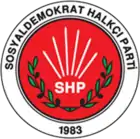Social Democratic Populist Party (Turkey)
The Social Democratic Populist Party (Turkish: Sosyaldemokrat Halkçı Parti, abbreviated SHP) was a Turkish social-democratic party, which resulted from the fusion, in 1985, of the Social Democracy Party (Sosyal Demokrasi Partisi, SODEP) of Erdal İnönü and the People's Party of Aydın Güven Gürkan, both founded in 1983 with the return to democracy after the military coup of 1980. In the local elections 1989 the SHP emerged as the strongest party with 27.8 percent of the vote, winning government power in 6 metropolitan areas, 39 provinces and 283 districts.[1] The Kurdish question placed the party under serious strain as it had seven MPs of Kurdish origin at a time when use of the Kurdish language was forbidden in public and private life in Turkey. Some of these MPs wanted to take part in the Kurdish Conference in Paris 1989, to which chairman İnönü wanted to agree. But after it emerged that representatives of the Kurdistan Workers' Party (PKK) could also take part, participation was forbidden. Seven Kurdish MPs took part anyway and all were expelled from the party,[2] even though the PKK was not present at the congress and in fact protested in front of the congress against it.[3] As a result Aydin Güven Gürkan, 12 other MPs of the SHP, dozens of regional party administrators and 3000 party members resigned from the SHP.[3] Nevertheless the party was one of the first parties to acknowledge that the Kurdish Question was not just an issue of terrorism. In the South Eastern Report published by the party in 1990 the problems of not acknowledging the Kurds as a distinct ethnic group were noticed. It was emphasized the Kurds should be able to express their Kurdish identity and legal barriers prohibiting this should be lifted.[2] After the 1991 general election, the SHP became a partner in the coalition government and İnönü became the deputy prime minister (Nov. 20). In the coalition agreement, the SHP insisted on the lifting of the ban on pre-1980 parties which were dissolved by the military government of the early 1980s. The pre-1980 parties were authorized on 19 June 1992. However, this was risky for the SHP. Shortly after the legalisation, a group of SHP MPs resigned from the party and refounded the Republican People's Party (CHP), Erdal İnönü's father's party (most party members were pre-1980 CHP members). The SHP and the CHP, two similar parties, co-existed for a while. On 6 June 1993 İnönü announced that he was planning to resign and Murat Karayalçın was elected as the new president of the party on 11 September 1993. Then the CHP and the SHP agreed to merge on 29 January 1995. Former foreign minister Hikmet Çetin (SHP) became the interim chairman and the merged party chose the name of CHP after İnönü's suggestion.
Sosyaldemokrat Halkçı Parti Social Democratic Populist Party | |
|---|---|
 | |
| Leader | Erdal İnönü |
| Founded | November 3, 1985 |
| Dissolved | February 18, 1995 |
| Merger of | Populist Party Social Democracy Party |
| Merged into | Republican People's Party |
| Headquarters | Ankara, Turkey |
| Ideology | Social democracy Secularism/Laicism Reformism Civic nationalism |
| Political position | Centre-left |
| Colors | Red |
 |
|---|
| This article is part of a series on the politics and government of Turkey |
|
|
Leaders
- 1985-1986 Aydın Güven Gürkan
- 1986-1993 Erdal İnönü
- 1993-1995 Murat Karayalçın
References
- Ciddi, Sinan (2009-01-13). Kemalism in Turkish Politics: The Republican People's Party, Secularism and Nationalism. Routledge. p. 79. ISBN 9781134025596.
- Ciddi, Sinan (2009-01-13). Kemalism in Turkish Politics: The Republican People's Party, Secularism and Nationalism. Routledge. p. 78. ISBN 9781134025596.
- Watts, Nicole F. (2010). Activists in Office. University of Washington Press. p. 62. ISBN 9780295990491.